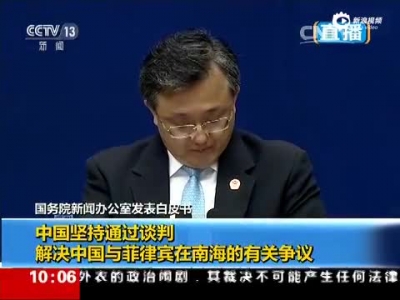White paper: Chinese sovereignty over the South China Sea Islands have full historical and legal grounds _ | | disputed South China Sea news

China's State Council information Office published the China adheres to a negotiated settlement of the dispute between China and the Philippines in the South China Sea white paper
Xinhua News Agency, Beijing, July 13 (reporters Hao Yalin and and Guo Likun)-China's State Council information Office published on 13th China insisted on a negotiated settlement between China and the Philippines in the South China Sea dispute white paper.
More than 20,000 words of the white paper, in addition to introduction, covering the South China Sea Islands are Chinese territory, Philippine Sea-related disputes in origin, the Philippines has reached on solving the dispute of South China Sea consensus led to complicate the dispute, the Philippines has repeatedly taken action, China's South China Sea policy of five parts.
White Paper says the Chinese activities in the South China Sea has more than 2000 years of history. China was first discovered, named and the exploitation of the South Sea Islands and waters, early and sustained, peaceful and effective manner to South China Sea Islands and exercised sovereignty and jurisdiction over the sea. China's sovereignty over the South China Sea Islands and related interests in the South China Sea, is established in a long historical process, widely recognized by the international community, has sufficient historical and legal evidence.
White paper pointed out that Philippine Sea in the core of the dispute is the Philippines resulting from the illegal occupation of part of the reef in the Nansha Islands China territory. From the perspective of history and international law, on the part of the reef in the Nansha Islands of the Philippines claims unfounded. In addition, the development of the international law of the leading Sino-Philippine maritime delimitation disputes occurred. Philippines deal with maritime disputes has gone through numerous discussions and reached consensus on consultations to solve the dispute through negotiations and confirmed many times in bilateral documents.
It said, then the Government of the Philippines 2013 sea arbitration case brought on a unilateral violation of the Sino-Philippine agreement to resolve the dispute through bilateral negotiations, China being parties to the United Nations Convention on the law of the right to free choice of dispute resolution, the abuse of the dispute settlement procedures of the Convention. Nanhai arbitration case should be established by the unilateral request of the Philippines from the beginning of the arbitral jurisdiction, is not valid because of the judgment, there is no binding. In the South China Sea territorial sovereignty and maritime rights and arbitral award does not affect in any circumstances. China does not accept, does not recognize the ruling against and do not take any actions based on claims and arbitral.
White Paper stressed, China has always comply with United Nations Charter of purposes and principles, firm maintenance and promote international rule of law, respect and practice line international law, in firm maintenance China in sea of territory sovereignty and marine interests of while, insisted through negotiations consultations solution dispute, insisted through rules mechanism tube control differences, insisted through benefit cooperation achieved total win, is committed to put sea construction into peace of sea, and friendship of sea and cooperation of sea. White paper said, China and regional countries to safeguard peace and stability in the South China Sea, and firmly safeguard national under international law in the South China Sea to enjoy the freedom of navigation and overflight, actively advocating foreign countries respect the region's efforts to play a constructive role in maintaining peace and stability in the South China Sea issue.
Responsible editor: Xiang Changming SN123
Article keywords:The South China Sea dispute
I want feedback
Save a Web page
Xinhua News Agency
白皮书:中国对南海诸岛主权有充分历史法理依据|南海|争议_新闻资讯

中国国务院新闻办发表《中国坚持通过谈判解决中国与菲律宾在南海的有关争议》白皮书
新华社北京7月13日电(记者郝亚琳、郭丽琨)中国国务院新闻办公室13日发表《中国坚持通过谈判解决中国与菲律宾在南海的有关争议》白皮书。
白皮书2万余字,除引言外,共包括南海诸岛是中国固有领土、中菲南海有关争议的由来、中菲已就解决南海有关争议达成共识、菲律宾一再采取导致争议复杂化的行动、中国处理南海问题的政策等五部分。
白皮书说,中国人民在南海的活动已有2000多年历史。中国最早发现、命名和开发利用南海诸岛及相关海域,最早并持续、和平、有效地对南海诸岛及相关海域 行使主权和管辖。中国对南海诸岛的主权和在南海的相关权益,是在漫长的历史过程中确立的,得到国际社会广泛承认,具有充分的历史和法理依据。
白皮书指出,中菲南海有关争议的核心是菲律宾非法侵占中国南沙群岛部分岛礁而产生的领土问题。从历史和国际法看,菲律宾对南沙群岛部分岛礁的领土主张毫无 根据。此外,国际海洋法制度的发展导致中菲出现海洋划界争议。中菲两国曾就妥善处理海上争议进行多次磋商,就通过谈判协商解决有关争议达成共识,并在双边 文件中多次予以确认。
白皮书说,菲律宾时任政府2013年单方面提起的南海仲裁案违反中菲通过双边谈判解决争议的协议,侵犯中国作为《联合国海洋法公约》缔约国自主选择争端解 决方式的权利,滥用《公约》争端解决程序。应菲律宾单方面请求建立的南海仲裁案仲裁庭自始无管辖权,所作出的裁决是无效的,没有拘束力。中国在南海的领土 主权和海洋权益在任何情况下不受仲裁裁决的影响。中国不接受、不承认该裁决,反对且不接受任何以仲裁裁决为基础的主张和行动。
白皮书强调,中国一贯遵守《联合国宪章》的宗旨和原则,坚定维护和促进国际法治,尊重和践行国际法,在坚定维护中国在南海的领土主权和海洋权益的同时,坚 持通过谈判协商解决争议,坚持通过规则机制管控分歧,坚持通过互利合作实现共赢,致力于把南海建设成和平之海、友谊之海和合作之海。白皮书表示,中国坚持 与地区国家共同维护南海和平稳定,坚定维护各国依据国际法在南海享有的航行和飞越自由,积极倡导域外国家尊重地区国家的努力,在维护南海和平稳定问题上发 挥建设性作用。
责任编辑:向昌明 SN123
文章关键词: 南海 争议
我要反馈
保存网页
新华社